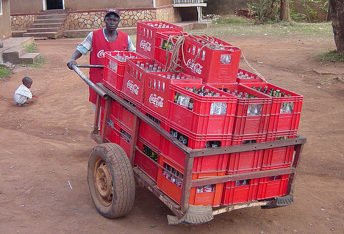
Coke, it’s everywhere. It’s in communities without electricity, running water or proper nutrition. Why? Because it’s an innovator in distribution, consumer analysis and marketing. What can the social impact sector (nonprofits, social enterprises, the public sector) learn from Coke that will allow us to save more lives? Melinda French Gates asked this question during a TEDxChange talk and identified three strengths that nonprofits can model:
1. Taking real time data and feeding it back into the product.
Organizations should establish mechanisms for gathering and evaluating data during a project and be willing to let the findings alter their approach mid-project. Coke’s consumer insight team focuses on tracking and analyzing where, how frequently and by whom each product is being consumed. This information is immediately fed back into product development, distribution and marketing. With economic development, evaluation typically occurs after a project’s completed, when it’s too late to use the data to improve project outcomes.
2. Tapping into local entrepreneurial talent
When Coke noticed that individuals were buying product in bulk and selling it to harder to reach places, it started training local entrepreneurs and set up micro-distribution centers and a small loan program. Today, 20 years later, 90% of Coke sales in Tanzania and Uganda are by micro-distributors.
NGOs should look for opportunities to facilitate local action and innovation and build in mechanisms that incent people based on how they’re impacted by the organization’s work.
3. Incredible marketing
Gates makes the salient point that nonprofits and governments (and all other breeds of social crusaders) make an assumption that if they think people need something, they don’t have to make people want it. Profit-driven entities rarely make this assumption, instead convincing us through inspiration, guilt, identity or insecurity that we need something we may never have wanted.
I’ve written before about Mechai Viravaidya’s irreverent and highly successful marketing tactics. Viravaidya is the founder of the Population Community Development Association, a hybrid social venture that aims to improve Thailand’s economy through population control. To destigmatize sex and family planning, the association held condom-blowing contests and Miss Condom beauty pageants and offered condoms in place of dinner mints at Viravaidya’s Cabbages and Condom restaurants. To inculcate safe sex, Viravaidya made his product the condom and he made it desirable. His approach was so powerful that the condom is known as a “mechai” in Thailand.
I’m not close to advocating that nonprofits establish Coke-like distribution channels or that they spend millions of dollars of funding on marketing, but too often the nonprofit and private sectors are too reactionary to the other’s ways. There are lessons from companies that nonprofits can apply that will strengthen their impact, and equally, there are lessons that companies can glean from nonprofits (performance of mission, for example).
What other lessons can we learn from other sectors and what are our sector’s strongest successes that we can share?





 I'm Olivia Khalili. I created Cause Capitalism to show you how to grow your business by incorporating a social mission.
I'm Olivia Khalili. I created Cause Capitalism to show you how to grow your business by incorporating a social mission. 

Your post reminds me of my time in Honduras as a Peace Corps volunteer. Not only were Coke (and Pepsi) masters of distribution and creating local entrepreneurs (we walked down the street to someone’s house to buy a Coke), they were also master recyclers. Those thick bottles were like gold b/c the deposits were so high. Distributors would come collect the old bottles, replacing them with full ones. It actually made me sad to see cans introduced into the country that ended up littered on the side of the road more than not. You’d never see a bottle littered. Too valuable.
It does, however, go back to demand. What are you “selling” and where’s the demand? The challenge w/ NPOs is that so often we need to scale a huge education learning curve to get to that point.
Great post, Olivia!
@meganstrand
Megan, great comment about the cans vs. bottles. I certainly don’t mean to imply that ‘Coke is great,’ rather to encourage taking solutions that work in other contexts and applying them to problems at hand. You’re absolutely right (and I like how you stated it) that a frequent challenge with nonprofits is education on the issue. That’s why I think Dr. Condom’s approach was so genius! Thanks, Olivia